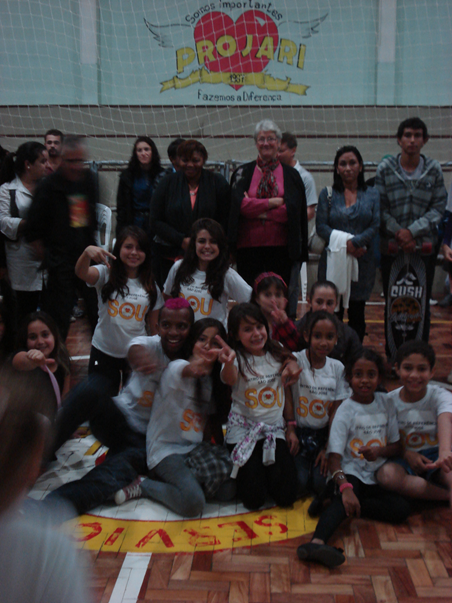It happened in Porto Alegre, Rio Grande do Sul, from October 11 to 14, 2012, the 10th Meeting of the Congregations of St. Joseph (Chambéry, Pinerolo, Cuneo, Concordia, Rochester and St. Joseph Institute.). Participating were 38 Sisters and 10 lay people, who, in their life and mission seek to live the spirituality of the “Little Project”, as it was called by the Founder, Father Jean Pierre Medaille.
The theme of the meeting was “A new look of hope in defense of life and of the planet that calls for liberation.” With the advice of sociologist and educator Moema Viezzer, we developed a process, trying to make this meeting not only an event but a process of formation. We were challenged to evaluate our presence and performance in the “Piece of the Planet” which are the territories of this country we live in and seek new ways to meet the demands of Mother Earth for humanity, applying the methodology of “Future Shop” in its three stages of sharing: – l. our dreams – II our difficulties, III – our common engagements on the horizon of the next four years.
l. – On the Tree of Hope we put our dreams summarized as follows:
• Change our stance on the issues raised in this meeting, both in the document of the Congregations of St. Joseph at the UN and in the testimonies of our communities;
• Be happy with what is necessary to live in the spirit of sustainable consumption discarding the consumerist spirit;
• Be respectful of life in all dimensions, starting with the dignity of human beings;
• Have an ecological understanding of God’s Word.
• Be a ‘body’ that assumes common actions in defense of creation, with lay people involved in the mission of the Congregation of St. Joseph;
• See strengthened and expanded our networks and partnerships in defense of life on the planet.
II. In the “Wailing Wall” we put our difficulties in achieving these dreams.
•We lack greater knowledge of environmental issues. As a result, we need more environmental awareness and action, with new attitudes and skills in order to participate; this includes monitoring the compliance with laws which lead to better quality of life for the environment and for people.
• We lack a better understanding of the relationship among the three dimensions of life: social-economic-environmental balance should be dealt with; the economy should serve the social and environmental, not the opposite as is the case today, in which the economy prevails over the socio- environmental.
• We lack pulling together and multiplying forces of related interests that may be constituted as resistance to the predatory model that manifests itself in various problems that we found: the use of water as a commodity and not as a common good, with the consequent neglect of the same in household, public and industrial use, lack of basic sanitation, garbage of all kinds – organic, recyclable / non-recyclable, electronic – without proper destination within the domestic, public and industrial sectors, abusive use of pesticides that poison the rivers, air and food; entire biomes being destroyed … among others.
III – In “The Way Forward” we put our current commitments to sustainability:
Deepen, disseminate and apply the DECLARATION of Congregations of St. Joseph at the UN both in the analysis of the global reality and in their recommendations.
Assume in our communities and groups with whom we work (at the local, regional, national level, etc.), special commitment to the two subjects most emphasized at the meeting: a) The care of Water as a universal common good and not mere ‘natural resource’; b) The care of the WASTE we produce. In both cases, promote sustainable consumption, reducing, reusing, recycling, reviewing and giving proper treatment to what is commonly called “junk” or “waste.”
• Widen the Tent of Communion and Unity with greater involvement of adult and youth laity, devoting time and action of communities to their formation.
• • Care for our human, biblical, theological and spiritual formation and invest continually in the training of lay leaders to improve our relationship with creation;
• Use possible crisis situations as opportunities for spiritual and prophetic growth.
• Seek support and partnerships with other organizations, promoting discussion forums with communities and participating in actions and campaigns that address local needs and rights which treat glaring local necessities most ignored in the realities in which we live.
Summing up
We know that some of these actions depend on us personally, on our communities and on our congregations. But we also know that many others depend on our cooperation with social, religious, ecclesial and political organizations with which we operate in our territory. In this sense, we left this meeting with the challenge of using all means at our disposal to meet the commitments we assumed and succeed in entering the new paradigm that is necessary and urgent for a Sustainable Future with a Responsible Present.
The historic moment we live brings a new call to contemplation / action for Life and the defense of the Planet that cries out for freedom. Thus, we conclude this letter, inviting all Religious and Laity of the Little Project begun in 1650, to embrace this cause together, bringing to today the original charism: “that all may be one.”






